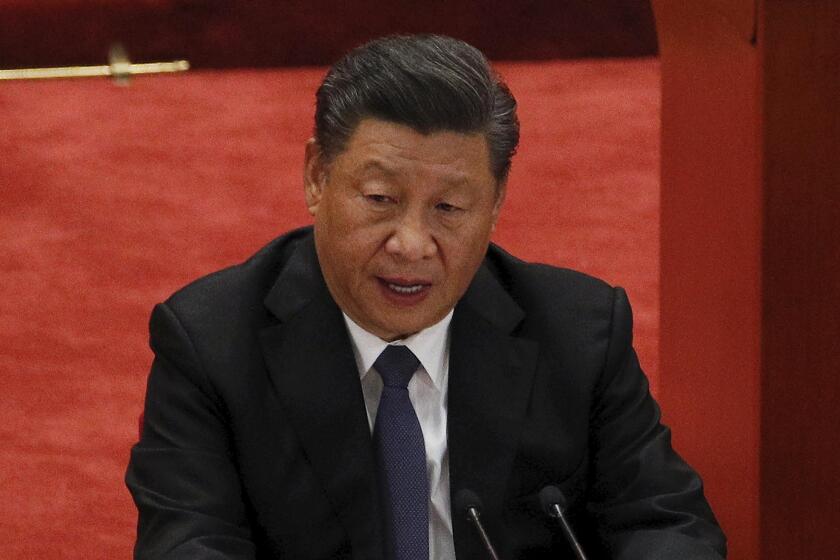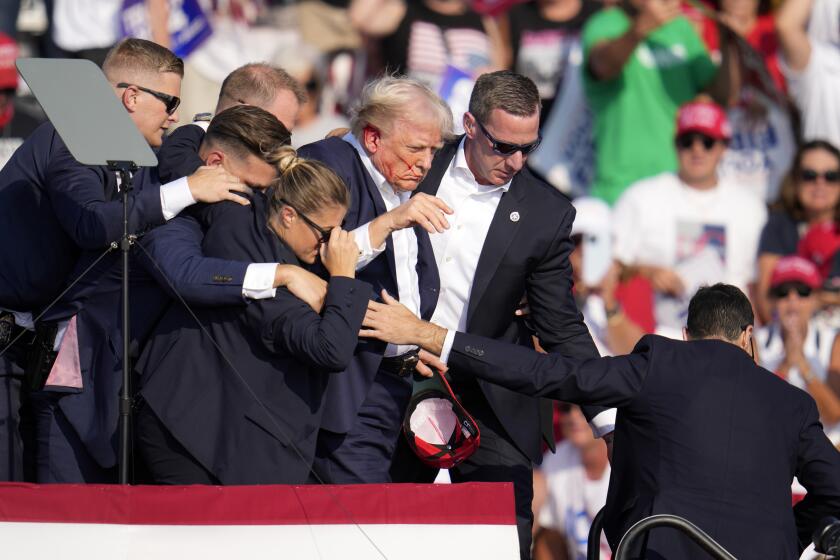Shultz Challenges Soviet Arms Offer : Calls It ‘Unacceptable’ Unless Cuts Stress Land-Based Strategic Missiles
Secretary of State George P. Shultz said Sunday that it is “unacceptable” to give equal weight to all nuclear warheads and bombs, which the new Soviet arms reduction offer appears to do, as Administration officials sought to dampen enthusiasm for Moscow’s proposal to slash the superpower arsenals up to 50%.
“The point about percentage reductions is: What do they apply to?” Shultz told the NBC program “Meet the Press.” The purpose of arms control is to reduce the threat of nuclear war, he said, and this requires cutting, “first and foremost, those weapons that constitute the greatest threat--the very powerful, highly accurate, many- warhead, land-based missiles.”
The United States has long urged the Soviet Union to cut its huge intercontinental ballistic missile force, which outnumbers U.S. land-based missiles and could wipe out virtually all U.S. ICBMs in a surprise attack. It therefore opposes a proposal that counts equally all nuclear bombs and warheads--those on lumbering bombers as well as fast-flying missiles--that one side may throw at the other.
Session With Reagan
Soviet Foreign Minister Eduard A. Shevardnadze, in his meeting with President Reagan on Friday, indicated that Moscow will be prepared to accept cuts up to 50% in missile warheads and bomber-carried missiles and bombs, according to Administration officials.
The United States has about 12,200 such “nuclear charges,” as the Soviets call them, and the Soviets have about 9,900. However, of the total, the Soviet Union has 6,420 ICBM warheads to 2,120 for the United States, according to a compilation by the Arms Control Assn.
“If their proposal is to go back to the argument that all warheads are the same, that’s unacceptable,” Shultz said.
Echoing the Administration’s concern about pitfalls in the Soviet proposal, Assistant Defense Secretary Richard N. Perle warned that the Soviet offer might define categories of weapons “in a self-serving way so that it includes some of our systems but not some of theirs.”
It would be “unfair and unbalanced,” he said on the CBS News program, “Face the Nation,” for Moscow to seek cuts in U.S. intermediate-range missiles and bombers in Europe, armed with nuclear weapons that can reach Soviet targets, but exempt their own intermediate forces in Europe, which cannot reach the United States but which could attack the allies of the North Atlantic Treaty Organization.
Gore Disagrees
Perle, who is broadly skeptical of arms control measures, characterized the Soviet effort to count all warheads and bombs equally as a “throwback to the pre-1972 period.”
Sen. Albert Gore Jr. (D-Tenn.), who has championed arms control measures, did not agree that the Soviets are reviving old ideas. But he also cautioned that “reductions in and of themselves” do not produce a safer world. “The key question is whether we can get an agreement to eliminate the first-strike (surprise attack) potential” of both superpowers, he said on the same program with Perle.
Before Shevardnadze’s visit, the Soviets had hinted that they would also propose a 60% ceiling on the warheads and bombs that could be mounted on any one of the three types of vehicles--land-based missiles, submarine-based missiles and bombers. However, he did not mention a maximum percentage limit for each basing mode, a figure that the United States considers more important than a simple, across-the-board cut in all weapons.
Shultz said he expects the Soviets to submit detailed proposals in each of the three arms control areas being discussed in Geneva--strategic (long-range) offensive nuclear weapons, intermediate-range offensive nuclear weapons and space and defense weapons.
Until now, he said, the Soviets have refused to talk seriously about cutting strategic and intermediate-range offensive weapons while insisting that the United States give up its Strategic Defense Initiative, or so-called “Star Wars” program, of research into anti-missile shields.
Shultz expressed hope that the Soviets will now eliminate this “precondition,” which has blocked progress in the arms control talks at Geneva.
In answer to a question, Shultz also said that it would be “very desirable” if the scheduled Nov. 19-20 meeting in Geneva of Reagan and Soviet leader Mikhail S. Gorbachev could produce a joint statement providing a framework for even greater arms control progress.
“We will certainly try” to formulate such a statement, he said. But he added that the United States will not be rushed into a declaration of that kind from Geneva just to produce something from the summit.
More to Read
Start your day right
Sign up for Essential California for news, features and recommendations from the L.A. Times and beyond in your inbox six days a week.
You may occasionally receive promotional content from the Los Angeles Times.






